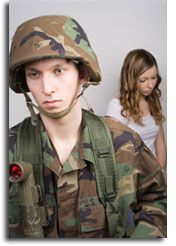Combat PTSD: What are the Symptoms?
 If you're a returning combat veteran having some difficulty readjusting to civilian life, you may be wondering what's going on. Why am I angry all the time? Why am I feeling detached?
If you're a returning combat veteran having some difficulty readjusting to civilian life, you may be wondering what's going on. Why am I angry all the time? Why am I feeling detached?
If this sounds like you, you may want to review the following list of some of the general symptoms associated with post-traumatic stress disorder (PTSD).
Click on 'Article Link' below tags for more...
The following is a composite of PTSD symptom descriptions culled from the Journal of Clinical Psychology Expert Clinical Guidelines Series; the always informative National Center for PTSD website; and the Vietnam Veterans Association of Australia.
What You Need to Know
PTSD Symptoms/Signs
So, let's take a look at the symptoms or signs of combat-related PTSD. They generally fall into 3 main categories:
Intrusive - Re-experiencing of the traumatic event(s)
Because trauma survivors have these upsetting feelings when they feel stress or are reminded of their trauma, they often act as if they are in danger again. They might get overly concerned about staying safe in situations that are not truly dangerous. For example, a person living in a safe neighborhood might still feel that he has to have an alarm system, double locks on the door, a locked fence, and a guard dog. Because traumatized people often feel like they are in danger even when they are not, they may be overly aggressive and lash out to protect themselves when there is no need. For example, a person who was attacked might be quick to yell at or hit someone who seems to be threatening.
Re-experiencing symptoms are a sign that the body and mind are actively struggling to cope with the traumatic experience. These symptoms are automatic, learned responses to trauma reminders. The trauma has become associated with many things so that when the person experiences these things, he or she is reminded of the trauma and feels that he or she is in danger again. It is also possible that re-experiencing symptoms are actually a part of the mind's attempt to make sense of what has happened.
Avoidant - Drawing inward or becoming emotionally numb
Because thinking about the trauma and feeling as if you are in danger is upsetting, people who have been through traumas often try to avoid reminders of the trauma. Sometimes survivors are aware that they are avoiding reminders, but other times survivors do not realize that their behavior is motivated by the need to avoid reminders of the trauma.
Trying to avoid thinking about the trauma and avoiding treatment for trauma-related problems may keep a person from feeling upset in the short term, but avoiding treatment means that in the long term, trauma symptoms will persist.
Hyperarousal - Increased physical or emotional arousal
Triggers can include any of the following:
Just Remember
Although you may be overwhelmed by your symptoms, you do have many resources available to you. Please make use of them. If you need immediate help, please get it. If you'd like to talk to someone about what you're going through, there are a lot of people and organizations you can turn to you may not be aware of. If you'd like to learn more, there are a wide variety of PTSD resources waiting to be explored by you.
And if you're seeking professional help, you've a lot of options to help you find relief and resolution to your PTSD.


